

Definition. To get the definition of another word, try using Wiktionary A definition attempts to explain a word using other words.
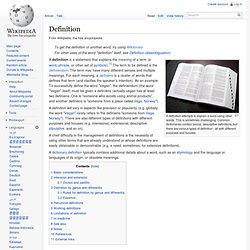
This is sometimes challenging. Common dictionaries contain lexical, descriptive definitions, but there are various types of definition - all with different purposes and focuses. A definition will vary in aspects like precision or popularity (e.g. globally, the word "Vegan" rarely refers to the definiens "someone from Vega, Norway"). Cosmology. The Hubble eXtreme Deep Field (XDF) was completed in September 2012 and shows the farthest galaxies ever photographed by humans.
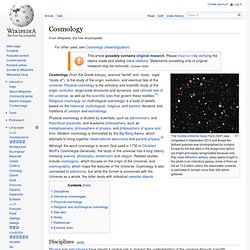
Except for the few stars in the foreground (which are bright and easily recognizable because only they have diffraction spikes), every speck of light in the photo is an individual galaxy, some of them as old as 13.2 billion years; the observable universe is estimated to contain more than 200 billion galaxies. Holism. For the suffix, see holism.
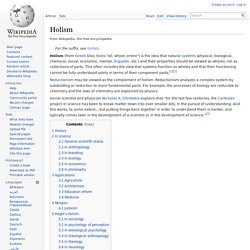
Holism (from Greek ὅλος holos "all, whole, entire") is the idea that natural systems (physical, biological, chemical, social, economic, mental, linguistic, etc.) and their properties should be viewed as wholes, not as collections of parts. This often includes the view that systems function as wholes and that their functioning cannot be fully understood solely in terms of their component parts.[1][2] Reductionism may be viewed as the complement of holism. Reductionism analyzes a complex system by subdividing or reduction to more fundamental parts.
For example, the processes of biology are reducible to chemistry and the laws of chemistry are explained by physics. Social scientist and physician Nicholas A. History[edit] The idea has ancient roots. The concept of holism played a pivotal role in Baruch Spinoza's philosophy[8][9] and more recently in that of Hegel[10][11] and Edmund Husserl.[12][13] In science[edit] General scientific status[edit]
System. Boundary (topology) A set (in light blue) and its boundary (in dark blue).
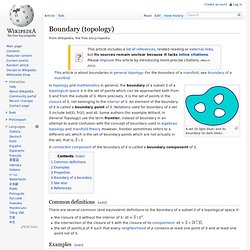
A connected component of the boundary of S is called a boundary component of S. There are several common (and equivalent) definitions to the boundary of a subset S of a topological space X: These last two examples illustrate the fact that the boundary of a dense set with empty interior is its closure. In the space of rational numbers with the usual topology (the subspace topology of R), the boundary of.
Doubt. Doubt, a status between belief and disbelief, involves uncertainty or distrust or lack of sureness of an alleged fact, an action, a motive, or a decision.
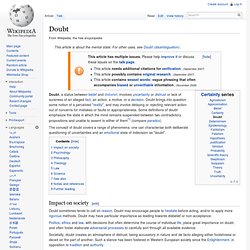
Doubt brings into question some notion of a perceived "reality", and may involve delaying or rejecting relevant action out of concerns for mistakes or faults or appropriateness. Some definitions of doubt emphasize the state in which the mind remains suspended between two contradictory propositions and unable to assent to either of them[1] (compare paradox). Conflict of interest. The presence of a conflict of interest is independent of the occurrence of impropriety.

Therefore, a conflict of interest can be discovered and voluntarily defused before any corruption occurs. A widely used definition is: "A conflict of interest is a set of circumstances that creates a risk that professional judgement or actions regarding a primary interest will be unduly influenced by a secondary interest. "[1] Primary interest refers to the principal goals of the profession or activity, such as the protection of clients, the health of patients, the integrity of research, and the duties of public office. Secondary interest includes not only financial gain but also such motives as the desire for professional advancement and the wish to do favours for family and friends, but conflict of interest rules usually focus on financial relationships because they are relatively more objective, fungible, and quantifiable.
Related to the practice of law[edit] Integrity. Whistleblower. A whistleblower (whistle-blower or whistle blower)[1] is a person who exposes misconduct, alleged dishonest or illegal activity occurring in an organization.
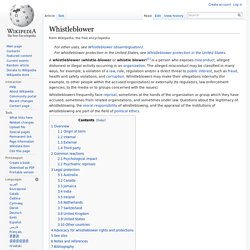
The alleged misconduct may be classified in many ways; for example, a violation of a law, rule, regulation and/or a direct threat to public interest, such as fraud, health and safety violations, and corruption. Whistleblowers may make their allegations internally (for example, to other people within the accused organization) or externally (to regulators, law enforcement agencies, to the media or to groups concerned with the issues). Corruption. The word corrupt when used as an adjective literally means "utterly broken".[1] The word was first used by Aristotle and later by Cicero who added the terms bribe and abandonment of good habits.[2] According to Morris,[3] corruption is described as the illegitimate use of public power to benefit a private interest.
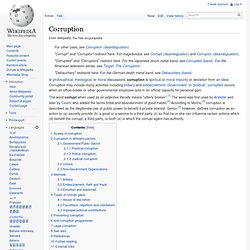
Senior,[4] however, defines corruption as an action to (a) secretly provide (b) a good or a service to a third party (c) so that he or she can influence certain actions which (d) benefit the corrupt, a third party, or both (e) in which the corrupt agent has authority. Scales of corruption[edit] Corruption can occur on different scales. Petty corruption occurs at a smaller scale and within established social frameworks and governing norms.
Examples include the exchange of small improper gifts or use of personal connections to obtain favors. Credibility. Traditionally, modern, credibility has two key components: trustworthiness and expertise, which both have objective and subjective components.
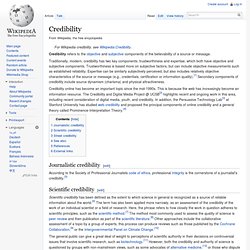
Trustworthiness is based more on subjective factors, but can include objective measurements such as established reliability. Expertise can be similarly subjectively perceived, but also includes relatively objective characteristics of the source or message (e.g., credentials, certification or information quality).[1] Secondary components of credibility include source dynamism (charisma) and physical attractiveness. Credibility online has become an important topic since the mid-1990s.
This is because the web has increasingly become an information resource. Source criticism. Source criticism (or information evaluation) is the process of evaluating an information source, i.e. a document, a person, a speech, a fingerprint, a photo, an observation or anything used in order to obtain knowledge.
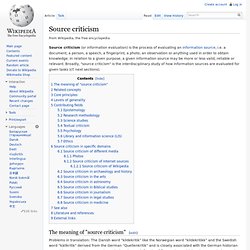
In relation to a given purpose, a given information source may be more or less valid, reliable or relevant. Broadly, "source criticism" is the interdisciplinary study of how information sources are evaluated for given tasks (cf. next sections). The meaning of "source criticism"[edit] Problems in translation: The Danish word “kildekritik” like the Norwegian word “kildekritikk” and the Swedish word “källkritik” derived from the German “Quellenkritik” and is closely associated with the German historian Leopold von Ranke (1795–1886). Hardtwig writes: "His [Ranke's] first work Geschichte der romanischen und germanischen Völker von 1494–1514 (History of the Latin and Teutonic Nations from 1494 to 1514) (1824) was a great success.
Related concepts[edit] Core principles[edit] Identifying reliable sources. To obtain or provide community input on whether a source meets our reliability standards for a particular use, see the reliable sources noticeboard. Wikipedia articles should be based on reliable, published sources, making sure that all majority and significant minority views that have appeared in those sources are covered (see Wikipedia:Neutral point of view).
The guideline in this page discusses the reliability of various types of sources. The policy on sourcing is Wikipedia:Verifiability, which requires inline citations for any material challenged or likely to be challenged, and for all quotations. How to Evaluate the Credibility of a Source (with Cheat Sheet) Edit Article Source Evaluation HelpEvaluating the Credibility of Sources Edited by Sbenjamin, Sondra C, Krystle, Luv_sarah and 41 others We are constantly surrounded by information, and it is not always easy to know which sources to trust. Being able to evaluate the credibility of information is an important skill used in school, work, and day-to-day life. With so much advertising, controversy, and blogging going on, how do you sift through the chaff and cut to the chase?